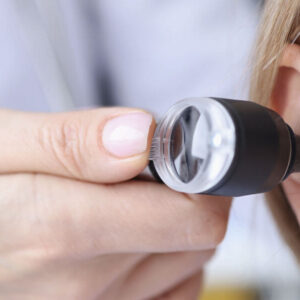
Adenoid Surgery: The adenoids are lymphoid tissue that function as part of the immune system in childhood, but in some cases can hypertrophy, leading to breathing problems, ear diseases, and sleep disorders. Especially adenoid enlargement can seriously affect a child’s quality of life and negatively impact speech and facial development. In such cases, adenoid surgery (adenoidectomy) offers an effective and permanent solution.
At his private clinic in Istanbul, ENT specialist Prof. Dr. Ozan Seymen provides his patients with healthy breathing and an improved quality of life through modern surgical techniques and patient-centered approaches in adenoid surgery.
In this article, we will comprehensively cover every detail—what adenoid surgery is, why it’s performed, who it’s suited for, how it’s carried out, and what the recovery process entails.
What Are the Adenoids and What Do They Do?
The adenoids (adenoid) are a mass of lymphatic tissue located between the back of the nose and the upper part of the throat that supports the immune system. They contribute to immune system development by recognizing microbes entering the body, especially during childhood.
However, over time, in some children the adenoids can grow larger than they should. This enlargement can block the airways, forcing mouth breathing, causing nasal congestion, frequent ear infections, and sleep problems. While the adenoids usually shrink by adolescence, surgical intervention is required if they cause serious problems.
What Problems Does Adenoid Enlargement Cause?
Adenoid enlargement can cause significant health issues, especially in young children. The most common problems include:
Nasal Congestion: Children are forced to breathe through the mouth, which adversely affects both daily life and nighttime sleep.
Mouth Breathing: Chronic mouth breathing can negatively affect facial development and dental alignment.
Sleep Apnea: Pauses in breathing during sleep leading to restless sleep.
Recurrent Ear Infections: Enlarged adenoids can block the Eustachian tube between the ear and throat, causing fluid accumulation in the middle ear and inflammation.
Hearing Problems: Conductive hearing loss may develop due to fluid accumulation in the middle ear.
Speech and Feeding Problems: Nasal obstruction can lead to voice changes and feeding difficulties.
Prof. Dr. Ozan Seymen diagnoses these issues through detailed clinical examination and endoscopic evaluations to formulate the correct treatment plan.
What Is Adenoid Surgery?
Adenoid surgery (adenoidectomy) is the surgical removal of enlarged adenoid tissue that blocks the airways and leads to other health problems.
The objectives are:
- To relieve nasal breathing,
- To improve sleep quality,
- To prevent ear infections and hearing problems,
- To support the child’s overall development.
Adenoidectomy is often performed together with tonsillectomy, but the decision is made based on the patient’s clinical condition.
Why Is Adenoid Surgery Performed?
The main indications for adenoidectomy are:
- Severe nasal airway obstruction
- Sleep apnea or restless sleep complaints
- Frequent or chronic middle ear infections
- Fluid accumulation in the middle ear (serous otitis) with associated hearing loss
- Risk of disturbed facial development (“adenoid face” appearance)
- Frequent sinusitis attacks
Prof. Dr. Ozan Seymen evaluates each patient’s clinical condition in detail and makes the surgical decision based on scientific criteria.
Who Is a Candidate for Adenoid Surgery?
Candidates for adenoid surgery include:
- Children over 3 years old experiencing significant breathing, sleep, or ear problems due to adenoid enlargement
- Individuals with hearing loss or frequent middle ear infections
- Children at risk of speech development or facial growth impairment
- Patients with both tonsil and adenoid enlargement
When deciding on surgery, the child’s age, overall health, and developmental stage are also considered.
Prof. Dr. Ozan Seymen analyzes each patient’s individual needs to plan the optimal timing and most appropriate surgical intervention.
How Is Adenoid Surgery Performed?
Adenoid surgery is a brief, safe procedure performed under general anesthesia.
During the procedure, the adenoids are visualized endoscopically or under direct view through the mouth. Specialized surgical instruments or modern methods (e.g., plasma technology, radiofrequency devices) are then used to remove the adenoid tissue.
No external incisions or sutures are required, as the entire procedure is performed through the mouth.
The operation typically takes 15–30 minutes. Patients are monitored for a few hours postoperatively and are usually discharged on the same day.
Prof. Dr. Ozan Seymen employs modern surgical techniques that minimize trauma while maximizing patient comfort and safety.
Postoperative Recovery After Adenoid Surgery
Recovery after adenoidectomy is generally quick and comfortable, though certain precautions should be taken.
In the first days, mild throat discomfort, a feeling of fullness at the back of the nose, and slight nasal discharge are normal. These symptoms resolve naturally over time.
Precautions during recovery include:
- Rest for the first few days.
- Maintain good oral hygiene.
- Children can usually return to school within 5–7 days.
- Avoid very hot and irritating foods for 10–14 days.
- Refrain from forceful nose blowing.
- Full healing may take 2–3 weeks; however, nasal breathing often improves markedly within days.
Prof. Dr. Ozan Seymen schedules regular follow-ups to ensure healthy progression of recovery.
Risks and Complications of Adenoid Surgery
Adenoidectomy is extremely safe when performed by an experienced ENT specialist; however, minimal risks can exist.
The most common risks include:
- Mild bleeding (especially within the first 24 hours)
- Infection (rare)
- Temporary nasal speech changes (hypernasality)
- Rarely, incomplete removal or regrowth of adenoid tissue
Prof. Dr. Ozan Seymen minimizes complication risks by using modern surgical techniques and strict sterilization standards.
Diet and Care After Adenoid Surgery
Proper nutrition during the postoperative period is crucial for pain relief and faster healing.
Recommended diet:
- First few days: Soft, cold or lukewarm foods (yogurt, custard, purees, ice cream, etc.).
- Avoid acidic beverages, spicy, hot, or hard foods.
- Ensure adequate fluid intake.
- Non-acidic fruit juices can be supportive.
Additionally, nasal hygiene is important; use nasal sprays or saline irrigation as recommended by your doctor to prevent infection.
Prof. Dr. Ozan Seymen provides personalized care and dietary instructions for each patient to support the healing process.
Adenoid Surgery Costs
Adenoid surgery costs vary based on:
- The patient’s age,
- The hospital’s technical equipment,
- The type of anesthesia,
- The surgeon’s experience,
- The surgical techniques used.
In Istanbul, Prof. Dr. Ozan Seymen offers personalized treatment plans with transparent pricing. The treatment plan typically includes preoperative evaluation, anesthesia services, the surgical procedure, and postoperative follow-ups.
Is Adenoid Surgery Painful?
No, the procedure is performed under general anesthesia. Mild throat discomfort postoperatively can be controlled with pain medications.
Does Nasal Breathing Improve Immediately After Surgery?
Yes, most patients notice a significant improvement in nasal breathing within the first few days.
Can the Adenoids Grow Back?
Regrowth is very rare when the adenoids are fully and properly removed.
When Can a Child Return to School?
Children usually return to school within 5–7 days but should avoid strenuous activities for two weeks.
Does My Voice Change After Surgery?
Temporary hypernasal speech may occur but typically returns to normal within 2–3 weeks.
Adenoidectomy offers a permanent and effective solution for breathing problems, frequent infections, and sleep disorders. It is crucial for healthy respiration, sleep patterns, and proper facial development in children.
İstanbul’da kendi kliniğinde hizmet veren KBB Uzmanı Prof. Dr. Ozan Seymen, through his scientific expertise, modern surgical techniques, and personalized patient care, achieves high success rates and maximum satisfaction.
If you or your child are suffering from adenoid-related problems and wish to improve quality of life, contact Prof. Dr. Ozan Seymen for detailed information and a tailored treatment plan.









 Türkçe
Türkçe Français
Français Deutsch
Deutsch